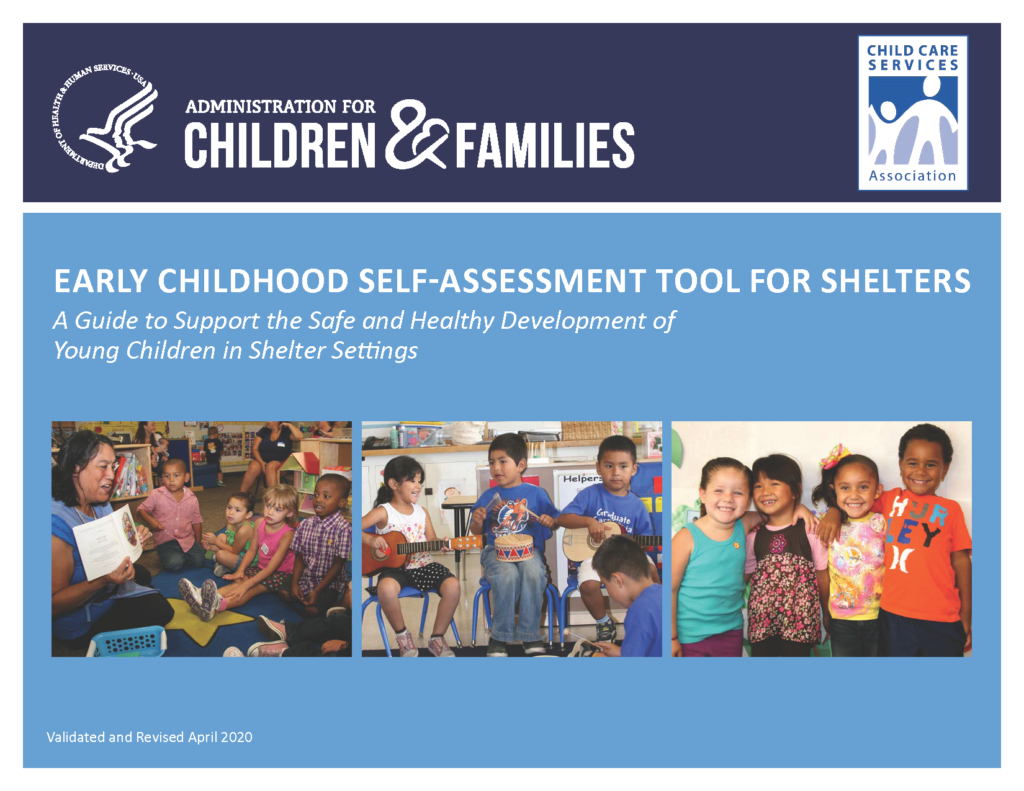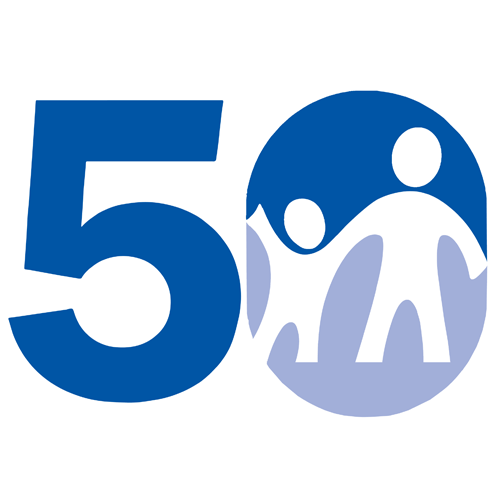This is a heartbreaking fact – the number of young children experiencing homelessness in the United States has grown in the last decade. In fact, this number increased to more than 1.4M in 2017-2018 [i]. That is one out of every 16 young children. What does that look like? Picture a preschool classroom and imagine that one of the young children sitting on the floor listening to the teacher read a favorite book is living in a shelter, on someone else’s couch, in their family’s car, in a cramped motel room or perhaps sleeping somewhere different every night! The ramifications of this level of destabilization on children and families are tremendous. Negative consequences abound. Being homeless as a child can cause negative effects that last for the rest of someone’s life. And, there are concerns today, that the COVID-19 health pandemic will increase family homelessness even more.

Ensuring the early learning and development of our country’s youngest children is essential to Child Care Services Association’s (CCSA) work. Supporting the well-being of these young children and their families is an urgent task and one that is critical to improving the long-term educational outcomes of children nationwide. It is why CCSA is pleased to release the validated and revised Early Childhood Self-Assessment Tool for Shelters, in partnership with the Administration for Children and Families (ACF), U.S. Department of Health and Human Services. This tool is designed to guide shelter staff in creating safe, developmentally appropriate environments for infants, toddlers, preschoolers and their families who are experiencing homelessness.
Often young children experiencing homelessness do not receive the social-emotional, educational, medical, mental health and/or special services they need to thrive. Infants and toddlers are particularly impacted by homelessness, with increased risk for early harm to their health and development, as well as having parents with poor physical and mental health, and additional hardships for families. [ii] In fact, infancy is the age at which a person is most likely to live in a U.S. Department of Housing and Urban Development (HUD) shelter. [iii]
Shelter staff can help ameliorate these issues for young children, if the shelter has a safe, developmentally appropriate environment for young children and easily connects to community partners who support early childhood development. The Early Childhood Self-Assessment Tool for Shelters can provide shelters the resources and information necessary to support the fragile young children in their care. With the tool’s abundant resources and guidance on best practices, shelters can assess how their programs can best meet the needs of vulnerable young children and their families. The tool also encourages shelters to develop relationships with local resources like early intervention and home visiting programs, child care and WIC, for help implementing new practices and to promote cross-program referrals. Finally, the tool guides shelters through developing action plans to promote positive experiences for children and families.

Knowing that safe and reliable child care is a key component of parents’ abilities to re-establish their lives and obtain steady employment, the self-assessment tool encourages shelters to build collaborations with early childhood programs in their communities. Many early childhood programs have expedited enrollment for families experiencing homelessness, and Head Start/Early Head Start programs are required to prioritize enrollment for these families. Enrolling in early learning programs gives children a chance to participate in age-appropriate activities that foster growth and development and learn at their own pace. Children who receive high quality early childhood education are more likely to be employed full-time and have more financial and personal assets as middle-age adults. [iv]
“The validated Early Childhood Self-Assessment Tool for Shelters has never been more important, as the COVID-19 pandemic is forcing more children to ‘shelter-in-place’ in environments that were not designed for young children, and at agencies that may not have expertise in early childhood development. Collectively, we must protect young children from the harm of homelessness, and take every step to make sure it does not limit their futures. This vital tool can help homeless shelters improve their physical environments, their practices and their partnerships to support young children at a time of great vulnerability, ultimately reducing the risk of experiencing homelessness as adults,” said Barbara Duffield, Executive Director of SchoolHouse Connection, a CCSA partner and lead organization in the Education Leads Home campaign.
The origins of the Early Childhood Self-Assessment Tool for Shelters
During my tenure as senior adviser for the Office of Early Childhood Development at the Administration for Children and Families, I had the opportunity to focus on early childhood homelessness. I quickly learned that homelessness among young children was on the rise and created numerous barriers for children’s development and multiple challenges for parents’ efforts at stabilizing their families.
Seeking ways to support both families and shelters that accept children and families, in 2014, we worked with a Congressional Emerson Hunger Fellow and developed the first edition of the Early Childhood Self-Assessment Tool for Family Shelters: A Guide to Support the Safe and Healthy Development of Young Children in Shelter Settings. The tool was shared by national organizations including NAEH, NAEHCY, CLPHA and SchoolHouse Connection and multiple federal departments as part of the USICH Early Childhood Workgroup. It was used in multiple locations across the country. People’s Emergency Center (PEC) in Philadelphia was using the tool in its BELL Project, and Sara Shaw was working with the project. BELL (Building Early Learning Links) connects early care and education programs to family emergency shelter and transitional housing providers to better respond to the needs of young children experiencing homelessness. Sara Shaw, a doctoral student at the University of Delaware under adviser Rena Hallam, associate professor in the Dept. of Human Development and Family Studies, worked on validating the tool as part of her dissertation. I stayed in contact with Sara during this process and helped coordinate support from the regional office so that she could obtain data from across the country. Her work was just amazing to me!
Fast forward to 2018, when, as president of Child Care Services Association (CCSA) in North Carolina, I continued my work with early childhood homelessness – providing a 50-state chart of CCDF plans by early childhood departments across the country and staying in contact with Sara as she completed her dissertation and validated this tool. In fall 2019, I convened a panel of early childhood experts at CCSA with Dr. Sara Shaw to explore the findings and changes that must be made and review the validated tool from an early childhood education perspective. Today, the validated and revised Early Childhood Self-Assessment Tool for Shelters is ready for release.
The public health and economic crises created by the COVID-19 pandemic are disproportionately impacting people experiencing homelessness. Shelters and other housing assistance programs, most of which are strained in normal circumstances, may be struggling even more to keep up with demand during this period. There may be more young children and families experiencing homelessness. We hope this tool will provide much needed support. Conversations are beginning with partners across the country as we develop technical assistance packages and a 50-state strategy for using the validated tool and connecting young children experiencing homelessness to services. If you are interested in being part of our research, please contact me.
You can find the Early Childhood Self-Assessment Tool for Shelters here.
[i] Yamashiro, A., McLaughlin, J. (2020). Early Childhood Homelessness
State Profiles – Data Collected in 2017-2018. U.S. Department of Education Office of Planning, Evaluation and Policy Development.
[ii] Cutts, D., Bovell-Ammon A., et al.. (2018). Homelessness During Infancy: Associations With Infant and Maternal Health and Hardship Outcomes. Cityscape: A Journal of Policy Development and Research, Volume 20 Number 2. U.S. Department of Housing and Urban Development.
[iii] Gubits, D., Shinn M., Bell S., Wood M., Dstrup S., Solari, C. (2015). Family options study: Short-term impacts of housing and services interventions for homeless families. Washington, D.C.: Prepared for U.S. Department of Housing and Urban Development, Office of Policy Development and Research by Abt. Associates and Vanderbilt University.
[iv] Sonnier-Netto, L., Landesman Ramey, S., Stack Hankey, M., Ramey, C. T. (2017). High Quality Early Care and Education Improves Adult Child–Parent Relationships (The Abecedarian Project). Virginia Tech Carilion Research Institute.




